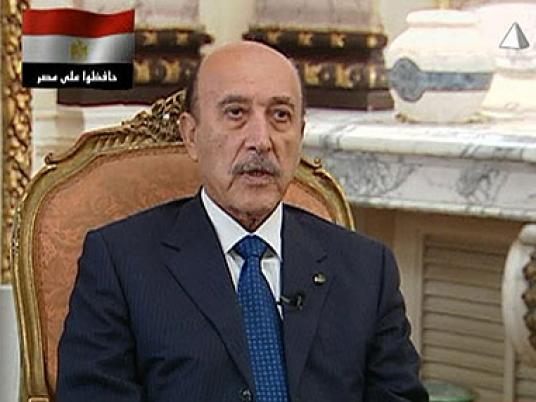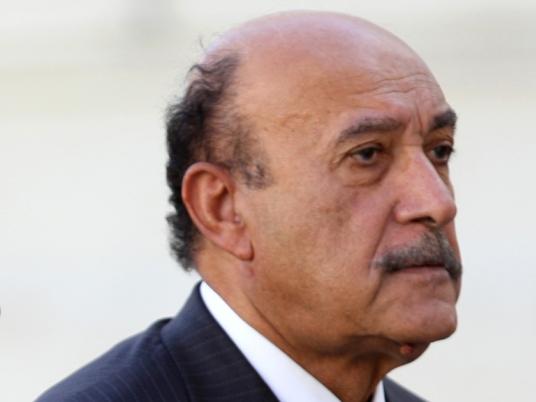Three political parties in Parliament, composed of some former members of Hosni Mubarak’s ruling National Democratic Party (NDP), intend to support Omar Suleiman, former head of the General Intelligence Services and former vice president, in his anticipated bid for presidency.
“I know Suleiman personally, and I trust he has a national vision to solve the country’s problems. And in case he runs, our party will support him and we will discuss with other candidates the probability of their withdrawal,” said Salah Hasaballah, president of the Egyptian Citizen Party.
The three parties are the Egyptian Citizen Party, the Freedom Party, and the Union Party, who have 14 MPs between them, have formed a parliamentary alliance called the Free Parliamentary Alliance.
Despite the conflicting media reports about Suleiman’s candidacy in the past months, members of the popular campaign that supports Suleiman’s nomination told Egypt Independent that the former spy chief aid is to announce his candidacy in a matter of hours. They say thousands of Egyptians have come forward to support Suleiman's candidacy.
Hasaballah added that this will be discussed with the other two parties so that they have a unified stance. However, the three parties will never endorse an Islamist candidate if Suleiman doesn’t run, and the door will be open to agree on another candidate, said Hasaballah in a press conference held Wednesday by the alliance.
Moataz Mohamed Mahmoud, a Freedom Party MP who heads the Free Parliamentary Alliance, explained his party’s earlier call for Field Marshal Hussein Tantawi to run for president. “He is the only powerful person who is capable of leading the country in the hard times we are passing through,” said Mahmoud. Tantawi has been the de facto head of state since Mubarak resigned on 11 February.
However, Mahmoud added, this would be under the condition that the president’s powers in the new constitution be limited to three national security ministries — the Foreign Affairs, Interior and Defense ministries — and that he stay in office for only one term.
In addition, the alliance slammed the majority Islamist parties’ recent row over withdrawing confidence from the government and their domination of the constituent assembly tasked with writing the constitution, calling the assembly to be restructured to represent all of society.
None of the 14 parliamentarians were chosen to sit on the 100-member panel from among the 50 MPs.
“The majority party [the Muslim Brotherhood’s Freedom and Justice Party] is pursuing an exclusive and selective policy and is imposing its authority over the political system even worse than the dissolved former ruling party’s actions…it is reproducing the pre-revolution dictatorship,” the Freedom Party said in a statement, despite accusations that the party’s members’ are loyal to the former regime.
Around 30 of those elected for the constituent assembly withdrew their membership on the same grounds and more than 30 political parties and movements launched a campaign to from a parallel constituent assembly that they claim would be more representative of Egyptian society.
However, the three parties said that they didn’t join the other parties’ campaign because it’s unrealistic and doesn’t put real pressure on Islamists to change their position.
“The parallel constituent assembly doesn’t have real legitimacy and it won’t have a genuine impact on the ground,” said Mahmoud.
The three parties also expressed their acceptance of Prime Minister Kamal al-Ganzouri’s government’s report, which was delivered to Parliament in February. The report was rejected by 19 parliamentary committees, and is the basis of the FJP’s call to withdraw confidence from the government, which has met resistance from the military council.
The parties gave their acceptance of the government’s report, despite some reservations on its content, to “guarantee a minimum level of political stability in the difficult times that Egypt is passing through, and that the situation doesn’t tolerate a political force wanting to form the government for the sake of dominating the political scene,” said the statement.
Mahmoud went as far as to accuse FJP of stirring instability and aiming to garner political gains with their call for withdrawing confidence from the government, as the FJP knows that the Constitutional Declaration does not give Parliament that power.
“They [FJP MPs] did not take any serious steps to withdraw confidence and they even cancelled all times set for questioning of the ministers by the MPs,” said Ihab Ramzy, a Freedom Party MP, hinting that their demands are not serious.
“Our main aim is to achieve the goals of the revolution and if we find it impossible to do that, I will personally resign from Parliament,” said Mahmoud.




